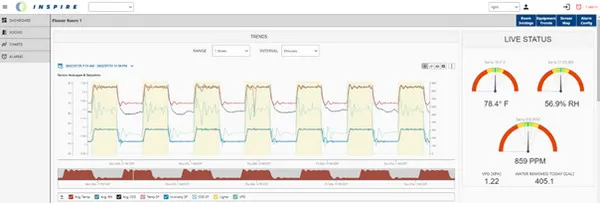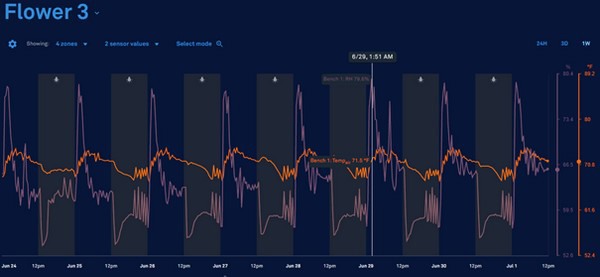"Price compression is rendering inadequate cultivation facilities obsolete. Cultivation businesses can no longer operate profitably without tight adherence to temperature, relative humidity, and CO2 set points," says Adrian Giovenco, Co-Founder and CEO of InSpire Transpiration Solutions.
The company was born in 2016 to help bridge the knowledge gap between plant physiology, HVAC design engineering, and finance. InSpire does this by providing and supporting purpose-built HVACD systems engineered for plant optimization rather than human-centric comfort. "The load dynamics and equipment needs inside a cultivation facility are fundamentally different than human-centric comfort cooling applications or other process environments. With so many underperforming cultivation facilities built around the world, it is fortunate that there are cost-effective ways to retrofit existing facilities with supplemental equipment and HVAC control infrastructure to greatly improve the energy balance of each grow room. Optimized plant performance is what it takes to produce high-quality products consistently."
Optimizing existing HVAC
With the current economic headwinds and industry challenges around banking, it is becoming more and more difficult for businesses to afford the CapEx expenditure of appropriate environmental control systems, Adrian notices. And with a lot of retrofitting happening now, many growers must work with the existing HVAC in the facility. "In most states that are coming online, growers are usually not given the best opportunities when it comes to available sites, and they need to work with what's available. There are many operations that have inferior environmental control systems and are locked into low-quality production at a high operating cost per pound. With increased competition and price compression, many of these growers are struggling to stay afloat."
To meet this need, InSpire offers a facility retrofit assessment, where they will evaluate the existing HVAC systems and controls infrastructure. In combination with the cultivation design criteria, such as canopy square footage, watering rates, and temperature and relative humidity set points, an energy balance report is developed that compares the cultivation design against the capacity of existing equipment, along with mechanical systems and control recommendations.
"Based on the budget and desire of the business owner, we will identify mechanical and/or control system retrofit opportunities. A control system upgrade makes it possible to access our InSpire Data Cloud, which gives powerful insight and control over high-impact changes to production metrics. We can also implement plant-centric sequences of operation to intelligently control existing HVAC and dehumidification systems and smooth out temperature, relative humidity, and CO2 trend lines, which are all critical parameters for optimizing photosynthesis and phenotypic expression. Additionally, intelligent control will improve unit economics through revenue gains on yield, quality, and consistency and through expense reductions on labor and energy."
Integrated control with sufficient capacity to match cultivation design 
Non-integrated control without sufficient capacity to match cultivation design
The importance of environmental control
It is essential for growers to get the most out of their HVAC systems. "Your cultivation facility is only as good as your weakest link. The majority of the time, the weakest link is environmental control," Adrian highlights. "You can have the best lights and irrigation systems, but without appropriate environmental control, you won't get the most out of any of the systems you implement. This is now more important than ever because of the increased competition and price compression occurring in the industry."
When it comes to InSpire's own HVAC systems, Adrian explains that their clients' results with their systems overshadow the upfront investment the systems require. "Appropriate environmental control is no longer a 'nice to have,' it is a must-have, and cultivation businesses of the future can no longer afford not to make the investment. With improved quality, the grower can sell their product at a premium price and differentiate from the competition. Moreover, they reduce the OpEx within the space. Using effective environmental control, you have the ability to crop steer and maintain VPD across the life cycle of the plant. As a result, your labor costs can be significantly reduced since the need to mitigate pest and pathogen pressures goes down. This all helps you maintain cleaner plants and increase secondary metabolite production. At the end of the day, over 80% of the opportunity to optimize your production lies within the environment."
For more information:
InSpire Transpiration Solutions
[email protected]
inspire.ag
